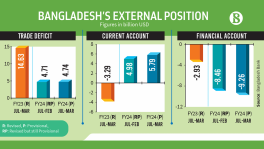Health sector budget: Is more allocation enough?
The budget should pay a good amount of attention towards ensuring financial protection from healthcare expenses

Like other parts of the world, Bangladesh is also facing the heat of Covid-19 pandemic – a crisis of an unprecedented scale in recent history. This unique situation also deserves a budget that is consistent with the pressing needs arising from this urgency.
Unfortunately, last year's budget – despite being big and ambitious – had fallen short of the criteria. Although the current year's budget is yet to come out, early news on the matter indicates that Bangladesh might witness another traditional budget this year.
Instead of any major overhauls in the existing maldistribution, it appears that a traditional as well as an incremental budget is set to be placed. The current listless bureaucracy will not or cannot give birth to a different one, and it is extremely likely that the budget will be very similar to what we have seen so far – just with a different size.
Though the current pandemic is predominantly unearthing the true and sad picture of the health system, last year's budget did not make any attempt to counter them. Repeating the same mistake will be unfortunate to say the least.
Even though Bangladesh aspires to achieve Sustainable Development Goals and Universal Health Coverage (UHC), there has not been any attempt to improve the three broad aspects of the UHC – namely the access, coverage and financial protection.
Instead, Bangladesh has experienced a worsening condition in financial protection. Out of 3Tk spent on healthcare two thirds are paid out of pocket, which is causing catastrophic health expenditure big enough to push people into poverty.
The World Health Organisation (WHO) estimates show that about five to six million people have fallen back into poverty due to catastrophic health expenditure.
However, there has not been any drive to solve this problem. Financial shock and poverty induced by it will make things even worse, and the unregulated private sector is just adding into the woe. Therefore, the current budget should pay a good amount of attention towards ensuring financial protection from healthcare expenses.
Though the second wave in Bangladesh is yet to become as bad as seen in India, the recent overflow of people during Eid and the opening of everything has increased the concerns for the second or third wave.
In fact, our projection model shows that Bangladesh may face another blow in the coming months. In addition, since we are not seeing any light in the tunnel in terms of vaccinating en masse soon, we have to stay with Covid-19 for longer.
Hence, Bangladesh should also allocate a good amount of its budget keeping the worst-case scenario under consideration. Covid-19 has brought the long-standing dents to the health system in the forefront.
Enough budget needs to be allocated to fix the ever-lasting problems as well as newly emerged ones triggered by the Covid-19 pandemic – such as the oxygen supply shortage.
Bangladesh has probably realised that banking on only India for the supply of vaccines was an utter mistake. Even though attempts are on to get the vaccine from various other sources, we should keep in mind that there are costs involved with such purchases, especially if we need to purchase doses from the high-cost sources such as Pfizer or Moderna.
In the budget, there should be some flexibility to address those potential uncertainties. In addition, as our communication campaign regarding the Covid-19 vaccine has been very weak, a good amount of budget should be allocated for that purpose.
Otherwise, our vaccination programme – even if we manage to get rid of the supply problem – can stumble.
Whenever it comes to the health budget as a share of total budget, Bangladesh usually ranks at the bottom of the list in South and Southeast Asia. Even that tiny share has not been utilised due to inefficiency.
Some would argue that since the health sector cannot spend what is allocated, then what is the point of allocating more money? But our poor performance in financial protection – to keep the out-of-pocket payment low and thus lower the catastrophic health expenditure – is a clear indication that the state is not doing enough for its citizens.
Maintaining the same structure will not help improve this situation. Along with an increased budget, a clear plan of spending in the right place is also required. In this pursuit, a health sector reform is paramount.
With the current bureaucratic framework, it is not possible. Therefore, the government should put serious thought into forming a "health commission" which will be run by a strong non-bureaucratic body with sufficient executive power.
Another neglected area in the health sector is a good amount of quality research. Even though some budgets are allocated under different OPs, most of the research is conducted by low-quality research firms through managing the relevant people.
Hence, the health commission's research wing can work on this, and can collaborate with top institutions of the country to ensure top quality research.
An increase in budget will require more financial resources. Since this pandemic is also making a huge strain in the tax collections, the government will also need to look for more sources.
Besides, an increase in tobacco taxes can be a great source and it has a win-win feature. The move can increase the tax revenue, as well as reduce the tobacco consumption which is leaving severe negative effects. Tax earned through tobacco taxation can rightly be earmarked to mobilise some funding for the health sector.
To sum up, Bangladesh is not spending enough for the health sector, which is resulting in millions of newer impoverishment due to health expenses.
Inefficient bureaucracy cannot be an excuse for not increasing the allocation. Rather, focus should be on how these inefficiencies can be overcome. A separate health commission can solve many problems.
As Bangladesh aspires to graduate from LDC to a developing country, poor and inefficient health sectors cannot be conducive in that endeavor. Hence, the budget should not only aim at increasing allocation, but also at enhancing efficiency to address health sector challenges during the pandemic and beyond.
Shafiun Nahin Shimul is an Associate Professor at the Institute of Health Economics at University of Dhaka


 Keep updated, follow The Business Standard's Google news channel
Keep updated, follow The Business Standard's Google news channel
















